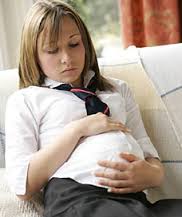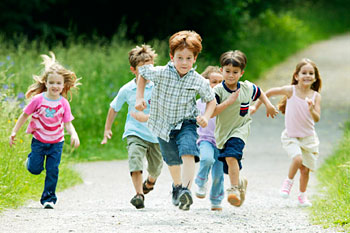 Our modern world is filled with screens: televisions, tablets, computers and mobile devices. As a result, children spend more time than ever before with these devices. We’ve written before about the downside of screen-time for small children and for the importance of moderation when it comes to technology. [Read more…]
Our modern world is filled with screens: televisions, tablets, computers and mobile devices. As a result, children spend more time than ever before with these devices. We’ve written before about the downside of screen-time for small children and for the importance of moderation when it comes to technology. [Read more…]
Deciphering the evidence on mental health in youth
 We often hear in media reports about the rise of autism and attention disorders in our society. A few years back, New York magazine ran a feature article titled, “Is Everyone on the Autism Spectrum?” that described the “cultural epidemic” of identifying with an autism-spectrum disorder such Asberger’s, obsessive-compulsive disorder or attention deficit disorder. But are these maladies really growing at alarming rates? And are our youth at risk? [Read more…]
We often hear in media reports about the rise of autism and attention disorders in our society. A few years back, New York magazine ran a feature article titled, “Is Everyone on the Autism Spectrum?” that described the “cultural epidemic” of identifying with an autism-spectrum disorder such Asberger’s, obsessive-compulsive disorder or attention deficit disorder. But are these maladies really growing at alarming rates? And are our youth at risk? [Read more…]
The evidence on children and napping
 For most stay-at-home moms, naptime is a much-welcomed break during a hectic day. Personally, having 2 hours to myself every afternoon allows me to catch up on messages, start preparing dinner, do some cleaning, and generally enjoy quiet that is elusive when my young children are awake. [Read more…]
For most stay-at-home moms, naptime is a much-welcomed break during a hectic day. Personally, having 2 hours to myself every afternoon allows me to catch up on messages, start preparing dinner, do some cleaning, and generally enjoy quiet that is elusive when my young children are awake. [Read more…]
New policy: Doctors should encourage early literacy
 Evidence established long ago that reading to young children – especially if you engage in a dialogue with them while you’re reading – helps them develop language skills and prepare for school.
Evidence established long ago that reading to young children – especially if you engage in a dialogue with them while you’re reading – helps them develop language skills and prepare for school.
Now the American Academy of Pediatrics has issued a new policy encouraging doctors to talk with parents about reading aloud to children, and providing books to low-income families at pediatric well visits. [Read more…]
What we know about pain relief during child birth
 Although epidural anesthesia was first used in the early 1940s, this form of pain relief was popularly used for laboring women until the 1970s. Since then, both health care providers and women have asked all sorts of questions about whether epidurals are safe and effective for women and babies. [Read more…]
Although epidural anesthesia was first used in the early 1940s, this form of pain relief was popularly used for laboring women until the 1970s. Since then, both health care providers and women have asked all sorts of questions about whether epidurals are safe and effective for women and babies. [Read more…]
Evidenced-based learning: Play, play, play
My two oldest children received letters in the mail this week from their teachers – a sure sign that “back-to-school” is creeping closer. As I start wrapping my head around school supplies and book schedules, I thought back to this post about the importance of play in learning. I’m hoping that my kids’ teachers keep in mind the importance of play in the classroom this year.
New evidence on post-partum depression
 Post-partum depression is a serious problem for many women. It’s estimated that up to 15 percent of new mothers suffer from depression at some point in their child’s first year of life – episodes that affect their ability to function in everyday life and can also have serious consequences for their children. [Read more…]
Post-partum depression is a serious problem for many women. It’s estimated that up to 15 percent of new mothers suffer from depression at some point in their child’s first year of life – episodes that affect their ability to function in everyday life and can also have serious consequences for their children. [Read more…]
The evidence on kangaroo care
 An estimated 18 million babies worldwide are born each year with low birthweight – the vast majority of them in developing countries where comprehensive neonatal care is not available. So what’s the best way to care for them? [Read more…]
An estimated 18 million babies worldwide are born each year with low birthweight – the vast majority of them in developing countries where comprehensive neonatal care is not available. So what’s the best way to care for them? [Read more…]
What we know about treating nausea during pregnancy
 Feeling nauseous while pregnant can have a debilitating effect on your life – making it difficult to concentrate at work, care for other children and even perform ordinary tasks like taking out the garbage. [Read more…]
Feeling nauseous while pregnant can have a debilitating effect on your life – making it difficult to concentrate at work, care for other children and even perform ordinary tasks like taking out the garbage. [Read more…]
How to keep teen parents in school
 The evidence shows that high school dropouts earn less money, have poorer health outcomes and are more likely to get into legal trouble. And teenagers who are pregnant or who are parents are especially vulnerable to dropping out of school. There are hundreds of programs designed to keep teens in school. But how effective are they, especially for pregnant and parenting teens?
The evidence shows that high school dropouts earn less money, have poorer health outcomes and are more likely to get into legal trouble. And teenagers who are pregnant or who are parents are especially vulnerable to dropping out of school. There are hundreds of programs designed to keep teens in school. But how effective are they, especially for pregnant and parenting teens?
Can the Use of Probiotics Effect Crying Babies?
 First off, I want to congratulate Sheri Hall on the birth of her daughter Charlotte, born on October 13th weighing in at 8 pounds 4 ounces!! Since babies have been on my mind in anticipation of Sheri’s maternity leave, a recent review about crying and colic behavior caught my eye. [Read more…]
First off, I want to congratulate Sheri Hall on the birth of her daughter Charlotte, born on October 13th weighing in at 8 pounds 4 ounces!! Since babies have been on my mind in anticipation of Sheri’s maternity leave, a recent review about crying and colic behavior caught my eye. [Read more…]




